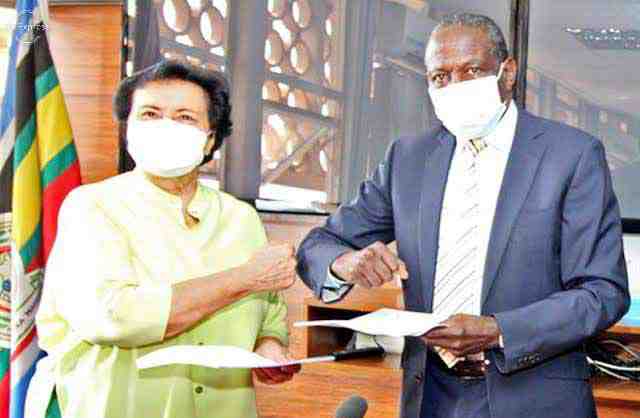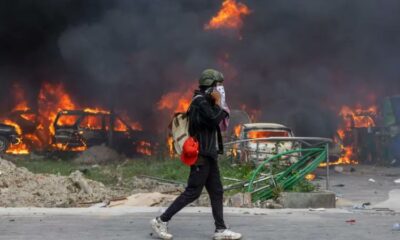Analysis
Pinetti’s coffee deal exposes collapse of mutual trust between the people and the leaders
If two married people lose confidence in each other, development and everything incidental to their matrimony, would mostly probably dip.
One of the spouses, or both of them, would start keeping a side business and or—at least a side a bank account— just in case the marriage ends up falling apart.
In the worst case scenario, each one of the couple, or at least both of them, would end up hooking up with a stranger for comfort but, with its chilling effects.
In short; trust, a key ingredient in any marriage institution worth the name, would progressively fly out of the window, as confidence shared among the spouses, also gradually leaves by the door.
It is sad that it has come to this point, where, as country currently the masses have lost all the confidence in their leaders to do good. In short, the leaders don’t have the goodwill from those they lead, a key ethos of nation building. What we have are leaders leading a life of the cat and the mouse!
And therein lies the dilemma of colossal proportions. Nothing can explain much more clearly this sad state of affairs than the huge hullabaloo currently rocking Uganda arising from the controversial coffee agreement the government signed with the shady Italian female investor. Her name is Enrica Pinetti.
The regime had treated the deal as a very top secret until the secret couldn’t be kept any longer. And the uproar it has triggered has reached every corner of the country and remains a hotly debated topic on dining tables and in meeting spots across the country.
Politicians, the clergy and everyone else, started lambasting the regime and Pinetti for handing the country a very, very raw deal. But just how?
To start with, the regime and Pinetti negotiated the deal without engaging the coffee farmers, key stakeholders, a larger part of the cabinet, the solicitor general and even the national parliament!
But, if the regime didn’t consult the coffee farmers, who are the key factor in the mix, who then was the regime purporting to act for while negotiating the deal? Secondly, if the people’s representatives in MPs were not involved, where then did the regime derive the approval, consent and authority to enter the deal with Pinetti?
Thirdly, if the Solicitor General was not consulted or even involved in the deal’s agreement drafting, who then purportedly drafted the final agreement?
Although he has owned it, perhaps for the sake of not embarrassing his boss, the Attorney General Kiryowa Kiwanuka appears not to have taken part in discussing the deal and even drafting it. This is because, he astonishingly told the Parliament committee probing this saga, how he got to appreciate the agreement from the President. And also from the former Agriculture Minister, Vincent Bamulangaki Ssempijja! Ssempijja now holds the docket for Defense and Veterans Affairs in Museveni’s cabinet.
If the AG didn’t participate in the process of negotiating the deal and that of drafting it, and instead only appreciated it from non-lawyers, how can he, at the same time, purport to understand it and defend it as valid, now that it has turned out to be controversial?
Shockingly, the regime not only excluded the coffee farmers, the MPs and Ugandans from the process of negotiating and that of awarding the coffee deal, but it also locked out majority of its cabinet ministers!
The bold ones such as Investments Minister, Evelyn Anite has since stepped out and revealed how Finance Minister, Matia Kasaija locked her out and majority of her colleagues in Cabinet during the process of negotiating the deal and signing the relevant agreement with Pinetti.
Anite stated how her contribution to the deal stopped at identifying the land where Pinetti is supposed to erect a coffee processing factory. Yet, she is one of the key ministers of finance whose docket deals with investments such as the one Pinetti was awarded.
“I was involved in identifying the land for Pinetti on which to build a coffee processing factory. I negotiated with Uganda Investment Authority for other incentives for the investor,” Anite told the Daily Monitor in an interview.
After that, Anite asserts, she was locked out of the key negotiations including that one of drafting the final agreement.
Anite just like other cabinet ministers, but who are talking in whispers fearful of a backlash from the powers-that-be backing Pinetti, as well as MPs led by the Speaker, Anita Among, dismiss the instant coffee deal as a terrible one.
Another key minister, Frank Tumwebaze, was also sidelined. Tumwebaze is the Minister of Agriculture. Accordingly, his say should have been ideally accommodated since coffee follows under his docket.
Prime Minister Robinah Nabbanja is said to have reported such bold ministers to the president, following repeated attacks by the Ministers directed at the coffee deal.
Among the ministers Nabbanja targeted was Tumwebaze and Anite. The two hit back by asking Nabbanja to stop gossiping about them merely because they had stated the truth regarding how they were not involved in the deal.
After being bombarded with questions and e-mails regarding the final suitability or lack of it of the final agreement, Tumwebaze advised the journalists to direct the queries to the minister of finance, Matia Kasaija.
Kasaija has since asserted how he didn’t require the input of any of the other colleagues in cabinet and anyone else as far negotiating and signing the final deal was concerned. He, for that reason, brags how he is the minister concerned with planning for the country, and so, it was within his mandate to sign the agreement without recourse to anyone!
But lawmaker Nathan Nandala Mafabi differs. He says the regime Kasaija serves was bereft of any right to sign an agreement on behalf of the coffee farmers.
“Government doesn’t grow coffee,” the MP from Budadiri asserts. Before throwing a philosophical question, “Where does the government which doesn’t grow coffee, derives the right to commit to supply coffee to Pinetti?
Kasaija conceded the point while appearing before the Parliament committee scrutinizing the deal. He admitted that government doesn’t grow coffee. But he added mockingly how the wanainchi should have faith in whatever they do, since it is them who elect them in the first place!
Kasaija’s argument can be justified going by the maxim to the effect that the country deserves the leaders it finds itself with. The leaders don’t fall from heaven. They are elected by the people themselves. So, how can we be seen and heard complaining about the actions and omissions of the leaders who we ourselves elect in the first place, and who have a choice to either change or keep every after five years?
Reverting to Mafabi, the man who chairs the board of the country’s only surviving Bugisu Cooperatuve Union (BCU), he is referencing the agreement’s clause where the regime undertakes to ensure a steady supply of coffee to Pinetti.
In spite of the fact that he doesn’t point out the fact, what government commits to do under the agreement is legally very, very problematic. Take a situation where the farmers refuse to grow coffee, where would the regime get the coffee to keep supplying to Pinetti in such an awkward situation?
Such a situation as the foregoing one would see Pinetti taking on the regime legally to make it pay heavily for the breach. At the end of the day, the government would use the taxpayer’s money to sort out Pinetti.
This would ideally call for consulting with the wanainchi in the first instance, before the regime could go on and seal deals of the magnitude the regime sealed with Pinetti.
But since the regime is fully aware that the deal is bad news for the coffee farmers and the country, for example, given that, among others, it allows Pinetti to set prices at which she buys coffee from the farmers, the regime couldn’t at any rate have consulted the wanainchi let alone the MPs and its own cabinet ministers in regard to the same agreement.
Given the litany of bad deals undertaken by the government especially with so-called foreign investors, the government fears to come to the people to present the proposals fearing a backlash. Likewise, the general public does not trust the government enough to produce agreements that cater for their interests.
Since we now know, it is imperative for all Ugandans to recover the lost confidence and trust among the leaders and the led, if any plan has a chance of success. So, help us Oh Lord!
Comments



























